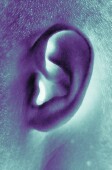
THURSDAY, March 6, 2014 (HealthDay News) — Volunteers are being recruited for a clinical trial to test a new method to treat ringing in the ears, the troubling condition known as tinnitus.
The technique being studied uses nervous system stimulation to “rewire” parts of the brain in an attempt to significantly reduce or eliminate tinnitus. If it proves successful, it could offer hope to millions of Americans with the disorder, according to the U.S. National Institute on Deafness and Other Communication Disorders (NIDCD), which is funding the study.
“Tinnitus affects nearly 24 million adult Americans,” NIDCD director Dr. James Battey Jr. said in a government news release. “It is also the number one service-connected disability for returning veterans from Iraq and Afghanistan. The kind of nervous system stimuli used in this study has already been shown to safely and effectively help people with epilepsy or depression. This therapy could offer a profoundly better way to treat tinnitus.”
During therapy, patients hear a series of single-frequency tones through headphones. At the same time, stimulation is delivered to the vagus nerve, which runs from the head and neck to the abdomen. When stimulated, the vagus nerve releases chemicals that can rewire the brain, the researchers explained in the news release.
Previous studies in rats and humans suggested that vagus nerve stimulation could be effective in reducing or eliminating tinnitus, according to the NIDCD.
The new clinical trial will include adults who have had moderate-to-severe tinnitus for at least a year. They will undergo daily 2.5-hour sessions of vagus-nerve stimulation and audio-tone therapy over six weeks.
The trial will be conducted at four centers through an agreement with a Dallas-based medical device company called MicroTransponder, Inc. The centers include the University of Texas at Dallas, University at Buffalo in New York and the University of Iowa. A fourth center will be announced later this year.
“This trial has the potential to open up a whole new world of tinnitus management,” Dr. Gordon Hughes, director of clinical trials at the NIDCD, said in the news release.
“Currently, we usually offer patients a hearing aid if they have hearing loss or a masking device if they don’t,” Hughes said. “None of these treatments cures tinnitus. But this new treatment offers the possibility of reducing or eliminating the bothersome perception of tinnitus in some patients.”
More information
The American Academy of Otolaryngology — Head and Neck Surgery has more about tinnitus.
Copyright © 2026 HealthDay. All rights reserved.

